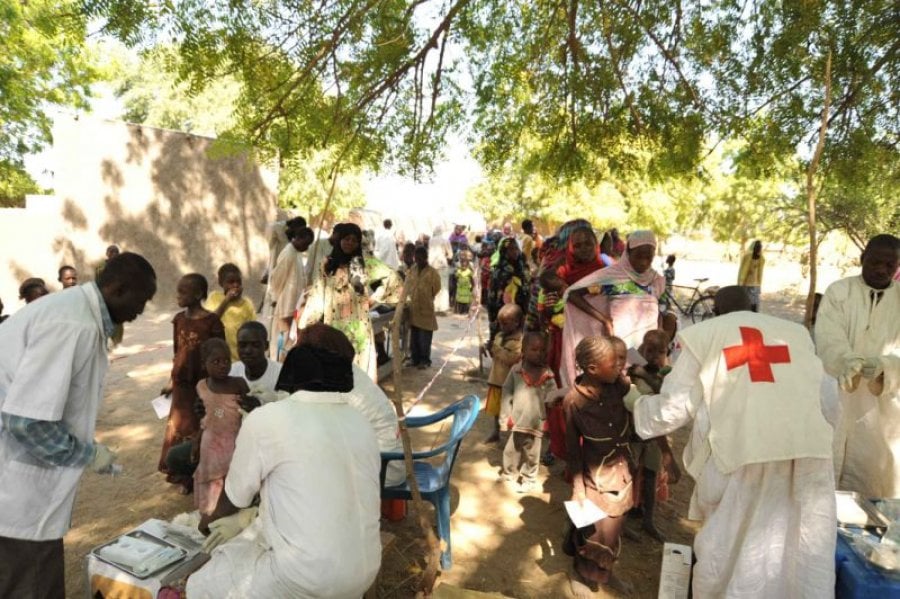Ministerial Conference on Immunization in Africa
2 March 2016 London School of Hygiene & Tropical Medicine London School of Hygiene & Tropical Medicine https://lshtm.ac.uk/themes/custom/lshtm/images/lshtm-logo-black.png
The contributions of Professor Sir Brian Greenwood and colleagues at the London School of Hygiene & Tropical Medicine to understanding and controlling meningococcal meningitis have been commended at a landmark Ministerial Conference on Immunization in Africa, held last week in Addis Ababa.
Ministers of Health from all over Africa gathered to discuss the issues around vaccination, and to sign the Addis Ababa Declaration on Immunization which promotes the use of vaccines to protect people of all ages against vaccine-preventable diseases. Organised by the World Health Organization and the African Union, this was the first-ever ministerial-level gathering with a singular focus on ensuring that children across the continent can get access to life-saving vaccines.
The elimination of polio from Africa was a key focus of the meeting, with speakers including the Sultan of Sokoto, who played an important part in the polio campaign in Nigeria. There was also a focus on the near elimination of epidemic meningococcal meningitis in Africa; a two day meeting was held prior to the main one to bring together all the people who have contributed to achieving this through the Meningitis Vaccine Project.
Professor Greenwood accepted an award on behalf of the School in recognition of the work of the African Meningococcal Carriage Consortium (MenAfriCar), which during the past eight years has investigated the epidemiology of meningococcal meningitis and pharyngeal carriage in seven countries in the sub-Saharan ‘meningitis belt’.
The consortium’s research showed that MenAfriVac®, the new group A meningococcal vaccine developed by the Meningitis Vaccine Project, eliminated carriage with this bacterium, and halted an epidemic of group A meningococcal disease in Chad. Mass vaccination campaigns have been scaled up across the region since 2010, and it is planned that nearly 300 million people in 15 countries will have received the vaccine by the end of next year.
Professor Greenwood commented: “This has been an excellent team effort, and all the partners in the Meningitis Vaccine Programme deserve tremendous credit for their collective achievement in reducing the mortality and suffering caused by meningitis in Africa.
“However the battle is not over: there were a significant number of cases of serogroup C meningococcal disease in Niger and Nigeria last year and it is likely a multivalent vaccine, which is effective against the five groups that cause meningitis outbreaks in Africa will be needed. Such a vaccine is under development at the Serum Institute in Pune, India, and the first clinical trials in Africa are planned for later this year.”
The Meningitis Vaccine Project is a collaboration of the World Health Organization and PATH, partnered with Serum Institute of India and public health officials across Africa to develop an affordable vaccine for use against meningitis A in sub-Saharan Africa.
In June 2016, the Prime Minister of Ethiopia will present the Addis Ababa Declaration at the 26th Summit of the African Union, to secure support from the African Heads of States to increase efforts to mobilise resources for national immunization programs.
Related Links
- Conference Media Centre with videos, reports, news and blogs
- The African Meningococcal Carriage Consortium (MenAfriCar) is funded by the Bill and Melinda Gates Foundation and the Wellcome Trust.
Image: Vaccination in Chad. Credit: Rodrigue Barry / WHO
Our postgraduate taught courses provide health practitioners, clinicians, policy-makers, scientists and recent graduates with a world-class qualification in public and global health.
If you are coming to LSHTM to study a distance learning programme (PG Cert, PG Dip, MSc or individual modules) starting in 2024, you may be eligible for a 5% discount on your tuition fees.
These fee reduction schemes are available for a limited time only.